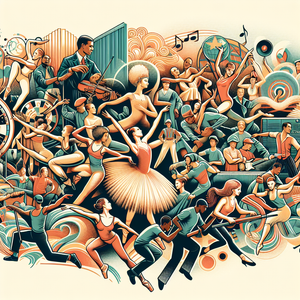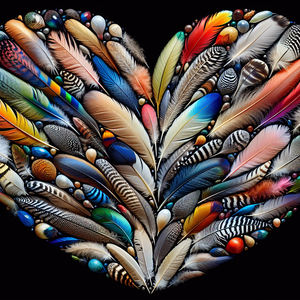
Unveiling Dance Careers: A Journey Through Diverse Opportunities and Popular Styles
Dance is a vibrant art form that transcends cultures and generations, presenting a rich tapestry of styles from the elegance of ballet to the electrifying beats of hip-hop. As interest in dance flourishes globally, so too does the potential for passionate individuals to forge meaningful careers within this dynamic industry. This article delves into various career paths in dance, illuminated by the connection between popular dance styles and the professional opportunities they cultivate.
Job Summaries:
Dance Instructor:
- Dance instructors are the heart and soul of dance education.
- They guide students through diverse styles like ballet, hip-hop, and salsa.
- By crafting lesson plans tailored to various skill levels, they instill a passion for movement and creativity.
- Typically, a degree in dance or education, along with teaching experience, is essential for success in this role.
Choreographer:
- Choreographers are the visionary artists who create compelling dance pieces that resonate with audiences.
- They collaborate closely with dancers and musicians to develop routines that tell a story.
- A solid foundation in multiple dance styles and strong leadership skills are crucial in this pivotal role within the artistic community.
Dance Therapist:
- Dance therapists harness the power of movement as a therapeutic tool to enhance emotional and physical well-being.
- They work with individuals from diverse backgrounds, crafting programs that foster healing and self-expression.
- A master's degree in dance therapy or a related field, along with certification, is generally required, underscoring the therapeutic potential of dance.
Dance Company Manager:
- Dance company managers oversee the operational side of dance organizations.
- They ensure that performances and rehearsals run seamlessly.
- They handle budgeting, marketing, and scheduling.
- This allows artists to focus on their craft.
- A background in arts management or business is vital in this role.
- Organizational prowess is also essential.
Performance Artist:
- Performance artists blend various dance styles into innovative works that captivate audiences in both theaters and public venues.
- This role demands versatility and a talent for improvisation.
- These artists often collaborate with others to push the boundaries of dance.
Dance Photographer:
- Dance photographers have the unique ability to capture the beauty and dynamism of movement through their lenses.
- A deep understanding of dance coupled with a keen eye for detail allows them to create striking images that enhance the visibility of the art form.
Dance Critic:
- Dance critics analyze and review performances.
- They offer insights that shape public perception of the art.
- A solid background in dance is essential.
- Exceptional writing skills are essential for critics.
- Critics influence appreciation for various works.
Dance Costume Designer:
- Costume designers play a pivotal role in visual storytelling.
- Creating costumes that complement the theme and style of a performance.
- A background in fashion or costume design is vital.
- These professionals enhance the overall aesthetic of dance productions.
Dance Studio Owner:
- Owning a dance studio provides an opportunity to foster a nurturing environment for dancers of all ages.
- Successful studio owners blend their dance expertise with business acumen to create programs that enrich their local dance community.
Dance Event Coordinator:
- Dance event coordinators are the logistical backbone of performances, competitions, and festivals.
- Their role encompasses marketing, audience engagement, and collaboration with various stakeholders.
- This role requires exceptional organizational skills and a keen understanding of the dance landscape.
Dance Educator:
- Dance educators teach in schools and community programs.
- They inspire a love for dance while developing students' skills.
- Typically, a degree in dance education or a related field is necessary.
- Teaching experience is also required.
Dance Historian:
- Dance historians research and document the evolution of dance styles.
- They contribute to the preservation of this rich art form.
- Often working within academic or cultural institutions.
- They provide valuable insights into the historical context of dance.
Dance Fitness Instructor:
- Dance fitness instructors combine movement with fitness routines to promote health and well-being.
- Certifications in group fitness or dance instruction are beneficial, as they create enjoyable and accessible exercise experiences.
Dance Researcher:
- Dance researchers explore various aspects of the art form, contributing to academic understanding.
- A background in sociology or anthropology is often needed.
- Strong research skills are necessary to inform dance practice and education.
Dance Makeup Artist:
- Dance makeup artists enhance performances through specialized makeup techniques that align with an artistic vision.
- A background in cosmetology and experience with theatrical makeup are essential, ensuring that dancers look their best on stage.
Dance Production Assistant:
- Supporting the logistical side of performances
- Dance production assistants aid in stage management
- Rehearsal coordination
- Strong organizational skills are crucial for success
- A passion for dance is crucial for success
- This is a behind-the-scenes role
Dance Social Media Manager:
- Dance social media managers curate online content for dance organizations.
- They effectively promote performances and engage with audiences.
- A background in marketing or communication is essential.
- Social media expertise is crucial for building connections between artists and their audience.
Dance Health Specialist:
- Focusing on injury prevention and rehabilitation.
- Dance health specialists ensure dancers maintain their physical well-being.
- A background in sports medicine or physical therapy is crucial for supporting the longevity of dancers' careers.
Dance Archivist:
- Dance archivists preserve valuable documentation of performances and choreography for future generations.
- A background in archival studies or library science is beneficial, ensuring that the history of dance remains accessible.
Dance Technology Specialist:
- Dance technology specialists bridge the gap between technology and performance.
- Enhancing artistic experiences through innovative tools like projection and sound design.
- A background in dance or technology is essential for this cutting-edge role.
By examining these diverse career opportunities within the dance industry, individuals can discover paths that resonate with their passion for movement and creativity. Understanding the interplay between popular dance styles and their related job prospects can empower aspiring professionals to make informed decisions about their futures. Whether your interests lie in teaching, performing, or supporting the operational side of dance, the field is rich with opportunities to make a lasting impact in this vibrant world of expression.
Explore More Jobs

